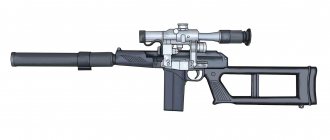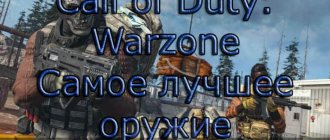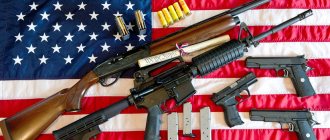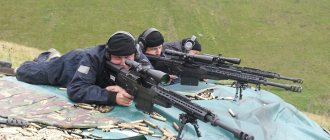| UK nuclear weapons | |
| Story | |
| Beginning of the nuclear program | April 10, 1940 |
| First test | October 3, 1952 |
| First thermonuclear explosion | May 15, 1957 |
| The last test | November 26, 1991 |
| Powerful explosion | 3 megatons (28 April 1958) |
| Total tests | 45 |
| Maximum warheads | 520 (1970s) |
| Current number of warheads | 215 (2016)[1][2] |
| Max. delivery distance | 12,000 (Trident II)[3] |
| Party to the NPT | Yes (since 1968) |
The UK's nuclear armament
consists of 4 nuclear submarines. Previously, the UK had other types of nuclear forces, but by 1998 they were all disbanded.
Great Britain is the only nuclear power in the world on whose territory there has never been a nuclear explosion.
History[ | ]
The British Armed Forces were created after the 1707 Act of Union between England and Scotland.
The British Armed Forces have a long history, having participated in many European and colonial wars, including:
- Seven Years' War
- Napoleonic Wars
- Crimean War
- First Opium War (1840-1842), Second Opium War (1856-1860) against China.
In addition, army units were used to suppress uprisings and unrest among the population (in particular, in Ireland).
Traditionally, the UK's armed forces have focused on the navy, with small ground forces.
The British Empire, which reached its apex in the 1920s, was the largest in human history, controlling a quarter of the globe, and one in three of the world's inhabitants were British subjects.
XX century[ | ]
Great Britain took part in a number of wars and military conflicts, including the suppression of the Boxer Rebellion in China, the Anglo-Boer War, and the First World War. By the First World War, the country's ground forces amounted to 432.4 thousand soldiers and officers, and the total number of troops of the British Empire was 894.9 thousand people[3]. In 1916, universal conscription was introduced, and a total of 8 million people were drafted during the war years[4].
After the October Revolution of 1917, British troops took part in foreign military intervention against Russia (USSR).
On February 6, 1922, Great Britain signed the Washington Agreement, according to which issues regarding the size of the naval forces of the largest maritime powers were resolved. This made it possible to reduce the cost of maintaining the English fleet, but meant abandoning the principle of “two fleets”, according to which the British fleet had to exceed the total fleet of the two naval powers following it.
In 1939, the British government was forced to impose tariffs on the import of British goods in India and use British taxes to modernize the Indian army in order to be able to use it outside the colony[5].
After Germany attacked Poland on September 1, 1939, Great Britain and its dominions Australia and New Zealand declared war on Germany on September 3, 1939 and entered World War II. Great Britain sent an expeditionary force to France, but the allies did not move on to active hostilities.
In September 1945, British troops landed in Malaya and in June 1948 began fighting against pro-independence guerrillas.
After the end of World War II in September 1945, British troops continued to serve in various parts of the world, but at the same time the collapse of the British colonial system began.
On March 17, 1948, in Brussels, England, France, Belgium, Holland and Luxembourg signed an agreement on collective security and military assistance ( Brussels Treaty
), as a result of which the Western Union was created - the first closed-type military-political bloc in post-war Europe, which provided for joint planning of military operations, standardization of weapons and the creation of “mobile armed forces” of 23 divisions (15 of which were to be provided by France, 5 divisions - England, and Belgium, the Netherlands and Luxembourg were supposed to jointly prepare three divisions)[6].
On April 4, 1949, Great Britain joined the military-political bloc NATO.
In 1950-1953 The British contingent participated in the Korean War.
In 1952, Great Britain carried out its first atomic weapon test. Thus, Great Britain became the third country (after the USA and the USSR) to acquire atomic weapons.
During the Suez Crisis of 1956, British troops took part in the fighting against Egypt.
In 1964, as a result of the merger of the Admiralty, the War Ministry (English) Russian. and the British Air Ministry, a single Ministry of Defense was created.
In 1982, the Falklands War took place between Great Britain and Argentina.
In 1990, the total number of armed forces (excluding territorial troops) was 317 thousand people[7].
In 1991, Great Britain participated in the Gulf War.
In 1999, Great Britain took part in the NATO operation against Yugoslavia.
In 2000, the number of armed forces (excluding territorial troops) amounted to 212.5 thousand people[7].
XXI century[ | ]
Great Britain is taking part in the war in Afghanistan; the British contingent within ISAF is the second largest (after the United States).
Great Britain took an active part in the war in Iraq: about 46 thousand military personnel took part in the invasion of Iraq[8], and subsequently a military contingent was left in the country. The British contingent was the largest in number after the US contingent, as of July 2007, the British contingent numbered 5,500 troops[9]. The UK announced the end of the military operation of British troops in Iraq ( Operation Telic
) April 30, 2009, but about 400 troops were left behind to train Iraqi troops[10].
By May 22, 2011, they had trained 1,800 Iraqi military personnel, after which the number of British military personnel in Iraq was reduced to 44 people who continued training as part of the NATO Training Mission-Iraq
[11].
In 2011, Great Britain took part in the military intervention in Libya, and in 2013 it took part in Operation Serval.
Links
Controls North Atlantic Council • Parliamentary Assembly • Supreme Headquarters Allied Powers Europe • Allied Command Transformation Personalities Secretary General • Chairman of the Military Committee • Supreme Commander for Europe • Supreme Commander for Transformation NATO operations NATO Operations • Eagle Guardian • Active Effort • Deliberate Force • Ocean Shield • Allied Provider • Allied Protector Formations KFOR • SFOR • Central Army Group • 2nd Joint Tactical Air Command • 4th Joint Tactical Air Command Members' armed forces Albania • Belgium • Bulgaria • Great Britain • Hungary • Germany • Greece • Denmark • Iceland • Spain • Italy • Canada • Latvia • Lithuania • Luxembourg • Netherlands • Norway • Poland • Portugal • Romania • Slovakia • Slovenia • USA • Turkey • France • Croatia • Czech Republic • Estonia Symbols Coat of Arms • Flag • Anthem Policy Government • Constitution • Parliament (House of Commons • House of Lords) • Government • Political parties • Legislative system • Executive system • Judicial system • Monarchy (monarchs) • Foreign policy • Domestic policy • Prime Minister Armed forces Navy • Air Force • Ground Forces Economy Currency • Banking system (Central Bank) • Stock exchange • Tourism (World Heritage) • Transport • Post office (history and stamps) • Tax system • British Rail • Internet (Internet domain) Geography Physical British Isles (Terminology • Great Britain (island)) • Geology[en] (Northern Ireland) • Lakes • Mountains[en] • Rivers • Volcanoes[en] Society Population • Languages (English) • Science • Education • Health • Sports • Religion • Prostitution Culture Architecture • Fine arts • Cinema • Literature • Music • Holidays • Cuisine Portal "Great Britain" •
Project "Great Britain"
Dynamics of defense spending[ | ]
- 1870 - £23.4 million (35% of total expenses, below this share is indicated in parentheses)[12]
- 1900 - £71.3 million (50%)[12]
- 1910 - £64.9 million (44%)[12]
- 1915 - 439.3 million pounds. Art. (80%)[12]
- 1916 - 1461.2 million pounds. Art. (90%)[12]
- 1917 - 1974.9 million f. Art. (90%)[12]
- 1918 - 2404.1 million pounds. Art. (89%)[12]
- 1919 - 2119.2 million pounds. Art. (86%)[12]
- 1920 - 693.7 million pounds. Art. (42%)[12]
- 1925 - 119.5 million pounds. Art. (16%)[13]
- 1930 - £118.6 million (16%)[13]
- 1935 - 121.9 million pounds sterling. (17%)[13]
- 1938 - £205.9 million (24%)[13]
- 1939 - £266.2 million (28%)[13]
- 1940 - £643.8 million (48%)[13]
An excerpt characterizing the British Armed Forces
- Oh, what hurts? - asked the soldier, shaking his shirt over the fire, and, without waiting for an answer, he grunted and added: - You never know how many people have been spoiled in a day - passion! Rostov did not listen to the soldier. He looked at the snowflakes fluttering over the fire and remembered the Russian winter with a warm, bright house, a fluffy fur coat, fast sleighs, a healthy body and with all the love and care of his family. “And why did I come here!” he thought. The next day, the French did not resume the attack, and the rest of Bagration’s detachment joined Kutuzov’s army. Prince Vasily did not think about his plans. He even less thought of doing evil to people in order to gain benefit. He was only a secular man who had succeeded in the world and made a habit out of this success. He constantly, depending on the circumstances, depending on his rapprochement with people, drew up various plans and considerations, of which he himself was not well aware, but which constituted the entire interest of his life. Not one or two such plans and considerations were in his mind, but dozens, of which some were just beginning to appear to him, others were achieved, and others were destroyed. He did not say to himself, for example: “This man is now in power, I must gain his trust and friendship and through him arrange for the issuance of a one-time allowance,” or he did not say to himself: “Pierre is rich, I must lure him to marry his daughter and borrow the 40 thousand I need”; but a man in strength met him, and at that very moment instinct told him that this man could be useful, and Prince Vasily became close to him and at the first opportunity, without preparation, by instinct, flattered, became familiar, talked about what what was needed. Pierre was under his arm in Moscow, and Prince Vasily arranged for him to be appointed a chamber cadet, which was then equivalent to the rank of state councilor, and insisted that the young man go with him to St. Petersburg and stay in his house. As if absent-mindedly and at the same time with an undoubted confidence that this should be so, Prince Vasily did everything that was necessary in order to marry Pierre to his daughter. If Prince Vasily had thought about his plans ahead, he could not have had such naturalness in his manners and such simplicity and familiarity in his relations with all the people placed above and below himself. Something constantly attracted him to people stronger or richer than himself, and he was gifted with the rare art of catching exactly the moment when it was necessary and possible to take advantage of people. Pierre, having unexpectedly become a rich man and Count Bezukhy, after recent loneliness and carelessness, felt so surrounded and busy that he could only be left alone with himself in bed. He had to sign papers, deal with government offices, the meaning of which he had no clear idea of, ask the chief manager about something, go to an estate near Moscow and receive many people who previously did not want to know about his existence, but now would offended and upset if he didn’t want to see them. All these various persons - businessmen, relatives, acquaintances - were all equally well disposed towards the young heir; all of them, obviously and undoubtedly, were convinced of the high merits of Pierre. He constantly heard the words: “With your extraordinary kindness,” or “with your wonderful heart,” or “you yourself are so pure, Count...” or “if only he were as smart as you,” etc., so he He sincerely began to believe in his extraordinary kindness and his extraordinary mind, especially since it always seemed to him, deep down in his soul, that he was really very kind and very smart. Even people who had previously been angry and obviously hostile became tender and loving towards him. Such an angry eldest of the princesses, with a long waist, with hair smoothed like a doll’s, came to Pierre’s room after the funeral. Lowering her eyes and constantly flushing, she told him that she was very sorry for the misunderstandings that had happened between them and that now she felt she had no right to ask for anything, except permission, after the blow that had befallen her, to stay for a few weeks in the house that she loved so much and where made so many sacrifices. She couldn't help but cry at these words. Touched that this statue-like princess could change so much, Pierre took her hand and asked for an apology, without knowing why. From that day on, the princess began to knit a striped scarf for Pierre and completely changed towards him. – Do it for her, mon cher; “All the same, she suffered a lot from the dead man,” Prince Vasily told him, letting him sign some kind of paper in favor of the princess. Prince Vasily decided that this bone, a bill of 30 thousand, had to be thrown to the poor princess so that it would not occur to her to talk about Prince Vasily’s participation in the mosaic portfolio business. Pierre signed the bill, and from then on the princess became even kinder. The younger sisters also became affectionate towards him, especially the youngest, pretty, with a mole, often embarrassed Pierre with her smiles and embarrassment at the sight of him. It seemed so natural to Pierre that everyone loved him, it would seem so unnatural if someone did not love him, that he could not help but believe in the sincerity of the people around him. Moreover, he did not have time to ask himself about the sincerity or insincerity of these people. He constantly had no time, he constantly felt in a state of meek and cheerful intoxication. He felt like the center of some important general movement; felt that something was constantly expected of him; that if he didn’t do this, he would upset many and deprive them of what they expected, but if he did this and that, everything would be fine - and he did what was required of him, but something good remained ahead. More than anyone else at this first time, Prince Vasily took possession of both Pierre’s affairs and himself. Since the death of Count Bezukhy, he has not let Pierre out of his hands. Prince Vasily had the appearance of a man weighed down by affairs, tired, exhausted, but out of compassion, unable to finally abandon this helpless young man, the son of his friend, to the mercy of fate and the swindlers, apres tout, [in the end,] and with such a huge fortune. In those few days that he stayed in Moscow after the death of Count Bezukhy, he called Pierre to himself or came to him himself and prescribed to him what needed to be done, in such a tone of fatigue and confidence, as if he was saying every time: “Vous savez, que je suis accable d'affaires et que ce n'est que par pure charite, que je m'occupe de vous, et puis vous savez bien, que ce que je vous propose est la seule chose faisable.” [You know, I'm swamped with things; but it would be merciless to leave you like that; Of course, what I’m telling you is the only possible one.] “Well, my friend, tomorrow we’re going, finally,” he told him one day, closing his eyes, running his fingers over his elbow and in such a tone as if what he was saying was it was decided long ago between them and could not have been decided otherwise. “We’re going tomorrow, I’ll give you a place in my stroller.” I am very happy. Everything important is over here. But I should have needed it a long time ago. This is what I received from the chancellor. I asked him about you, and you were enlisted in the diplomatic corps and made a chamber cadet. Now the diplomatic path is open to you. Despite the strength of the tone of fatigue and the confidence with which these words were spoken, Pierre, who had been thinking about his career for so long, wanted to object. But Prince Vasily interrupted him in that cooing, bassy tone that excluded the possibility of interrupting his speech and which he used when extreme persuasion was necessary. - Mais, mon cher, [But, my dear,] I did it for myself, for my conscience, and there is nothing to thank me for. No one ever complained that he was too loved; and then, you are free, even if you quit tomorrow. You will see everything for yourself in St. Petersburg. And it’s high time for you to move away from these terrible memories. – Prince Vasily sighed. - Yes, yes, my soul. And let my valet ride in your carriage. Oh yes, I forgot,” Prince Vasily added, “you know, mon cher, that we had scores with the deceased, so I received it from Ryazan and will leave it: you don’t need it.” We will settle with you. What Prince Vasily called from “Ryazan” were several thousand quitrents, which Prince Vasily kept for himself. In St. Petersburg, as in Moscow, an atmosphere of gentle, loving people surrounded Pierre. He could not refuse the place or, rather, the title (because he did nothing) that Prince Vasily brought him, and there were so many acquaintances, calls and social activities that Pierre, even more than in Moscow, experienced a feeling of fog and haste and everything coming, but some good not happening. Many of his former bachelor society were not in St. Petersburg. The guard went on a campaign. Dolokhov was demoted, Anatole was in the army, in the provinces, Prince Andrei was abroad, and therefore Pierre was not able to spend his nights as he had previously liked to spend them, or to occasionally unwind in a friendly conversation with an older, respected friend. All his time was spent at dinners, balls and mainly with Prince Vasily - in the company of the fat princess, his wife, and the beautiful Helen. Anna Pavlovna Scherer, like others, showed Pierre the change that had occurred in the public view of him. Previously, Pierre, in the presence of Anna Pavlovna, constantly felt that what he was saying was indecent, tactless, and not what was needed; that his speeches, which seem smart to him while he prepares them in his imagination, become stupid as soon as he speaks loudly, and that, on the contrary, the stupidest speeches of Hippolytus come out smart and sweet. Now everything he said came out charmant. If even Anna Pavlovna did not say this, then he saw that she wanted to say it, and she only, in respect of his modesty, refrained from doing so. At the beginning of the winter from 1805 to 1806, Pierre received from Anna Pavlovna the usual pink note with an invitation, which added: “Vous trouverez chez moi la belle Helene, qu'on ne se lasse jamais de voir.” [I will have a beautiful Helen, whom you will never tire of admiring.] Reading this passage, Pierre for the first time felt that some kind of connection had formed between him and Helen, recognized by other people, and this thought at the same time frightened him, as if an obligation was imposed on him that he could not keep, and together he liked it as a funny assumption. Anna Pavlovna's evening was the same as the first, only the novelty that Anna Pavlovna treated her guests to was now not Mortemart, but a diplomat who had arrived from Berlin and brought the latest details about the stay of Emperor Alexander in Potsdam and how the two highest each other swore there in an indissoluble alliance to defend the just cause against the enemy of the human race. Pierre was received by Anna Pavlovna with a tinge of sadness, which obviously related to the fresh loss that befell the young man, to the death of Count Bezukhy (everyone constantly considered it their duty to assure Pierre that he was very upset by the death of his father, whom he hardly knew) - and sadness exactly the same as the highest sadness that was expressed at the mention of the august Empress Maria Feodorovna. Pierre felt flattered by this. Anna Pavlovna, with her usual skill, arranged circles in her living room. The large circle, where Prince Vasily and the generals were, used a diplomat. Another mug was at the tea table. Pierre wanted to join the first, but Anna Pavlovna, who was in the irritated state of a commander on the battlefield, when thousands of new brilliant thoughts come that you barely have time to put into execution, Anna Pavlovna, seeing Pierre, touched his sleeve with her finger. – Attendez, j'ai des vues sur vous pour ce soir. [I have plans for you this evening.] She looked at Helen and smiled at her. – Ma bonne Helene, il faut, que vous soyez charitable pour ma pauvre tante, qui a une adoration pour vous. Allez lui tenir compagnie pour 10 minutes. [My dear Helen, you must be compassionate towards my poor aunt, who has adoration for you. Stay with her for about 10 minutes.] And so that you don’t get too bored, here’s a dear count who won’t refuse to follow you. The beauty went to her aunt, but Anna Pavlovna still kept Pierre close to her, appearing as if she had one last necessary order to make. – Isn’t she amazing? - she said to Pierre, pointing to the majestic beauty sailing away. - Et quelle tenue! [And how she holds herself!] For such a young girl and such tact, such a masterful ability to hold herself! It comes from the heart! Happy will be the one whose it will be! With her, the most unsecular husband will involuntarily occupy the most brilliant place in the world. Is not it? I just wanted to know your opinion,” and Anna Pavlovna released Pierre.
Current status[ | ]
The United Kingdom has a modern armed forces. According to the UK Ministry of Defense, the United Kingdom ranks second in terms of military spending in the world, although this is not true, it ranks only 9th, with an army size of 180,000 (28th in the world). The bulk of the military budget is spent on scientific research in the field of engineering and technology[15]. Despite its considerable resources, it is the policy of the Ministry of Defense that British troops participate in military operations of any kind only as part of a coalition, only the Falklands conflict of 1982 differed from this policy.
The Royal Navy is the second largest in the world in terms of tonnage, with 91 active ships. The Naval Service, which unites the Royal Navy and the Royal Marines, had 35,470 military personnel as of July 2006. In addition, under the command of the Naval Service there are 4 nuclear submarines with nuclear missiles on board. Marines participate in various NATO operations, forming commando assault teams or special forces units.
The number of British ground forces is 100,000, while the Royal Air Force numbers 45,210. The number of women in the army reaches 9 percent. In addition, reservists and the Territorial Army (TA) make up another 45,000, bringing the total number of Armed Forces to 225,000 people[16].
Branch of troops and service[ | ]
| History of the British Army | |
| Anglo-Saxon warfare | |
| New model army | |
| English army | |
| British Army | |
Infantry
(eng. Infantry) The British infantry consists of 36 regular battalions and 14 territorial battalions and forms 17 regiments, with one or more regular battalions, and, in most cases, attached territorial army battalions. The British cavalry currently consists of the House Cavalry Regiment, the remaining eight existing regular cavalry regiments retain their names only nominally as they are part of the Royal Tank Corps (British Army of the British Armed Forces). Of the irregular army, only four cavalry regiments of the Yeomanry Cavalry remained in service, also retaining their names only nominally, as well as eight cavalry regular regiments are also part of the Royal Tank Corps (Territorial Army of the British Armed Forces).
The main tactical unit of the British Army is the battalion. The regiment performs an administrative function and also deals with issues of staffing units. A similar function to regiments is performed by “corps”, which in no case should be perceived as operational formations of ground forces with the same name.
Royal Armored Corps
(eng. Royal Armored Corps)
Royal Regiment of Artillery
(eng. Royal Regiment of Artillery)
Corps of Royal Engineers
or
Corps
of Royal Engineers
Royal Corps of Electromechanical Engineers
(eng. Corps of Royal Electrical & Mechanical Engineers)
Royal Corps of Signals
(eng. Royal Corps of Signals)
Intelligence Corps
(English Intelligence Corps)
Royal Logistics Corps
(eng. Royal Logistic Corps)
Army Air Corps
(eng. Army Air Corps)
Royal Department of Army Chaplains
(eng. Royal Army Chaplains' Department)
Adjutant Corps
(eng. Adjutant General's Corps)
- Military Police Branch of the Adjutant Corps
(eng. Provost Branch, Adjutant General's Corps Provost) - Army Legal
Services
Staff & Personnel Support- Educational and Training
Services
British Army Medical Service
Army Medical Services
Army Music Corps
(eng. Corps of Army Music)
Army Physical Training Corps
Army Physical Training Corps
Small Arms Training Corps
(eng. Small Arms School Corps)
Composition of the armed forces[ | ]
Navy[ | ]
Main article: Royal Navy
Ground forces[ | ]
Main article: British Land Forces
Air Force[ | ]
Main article: Royal Air Force
Special Forces[ | ]
Main article: UK Special Forces
Medical service[ | ]
Main article: British Armed Forces Medical Service
Ranking system[10][ | ]
Main articles: Military ranks and insignia of officers of the British Army
and
Military ranks and insignia of enlisted personnel of the British Army
| Original | Translation | Insignia |
| Marshals | Field Marshal | Field Marshal |
| Generals | General | General |
| Lieutenant-General | Lieutenant General | |
| Major-General | Major General | |
| Senior officers | Brigadier | Brigadier |
| Colonel | Colonel | |
| Lieutenant Colonel | Lieutenant colonel | |
| Major | Major | |
| Junior officers | Captain | Captain |
| Lieutenant | Lieutenant | |
| Second Lieutenant | Second Lieutenant | |
| Cadets | Officer Cadet | Officer school cadet |
| Warrant Officers | Warrant Officer Class 1 | Warrant Officer First Class |
| Warrant Officer Class 2 | Warrant Officer Second Class | |
| Sergeants | Staff Sergeant | Staff Sergeant |
| Sergeant | Sergeant | |
| Privates | Corporal | Corporal |
| Lance Corporal | Lance Corporal | |
| Private | Private | Without insignia |
Notes[ | ]
- Defense Analytical Services and Advice: UK Armed Forces Monthly Manpower Statistics / UK Ministry of Defense website
- European Defense / UK Ministry of Defense website
- https://lib.urfu.ru/player.php P. 33
- https://lib.urfu.ru/player.php pp. 33 - 34
- Dominic Lieven. The Russian Empire and its enemies from the 16th century to the present day. / lane from English A. Kozlik, A. Platonov. M.: “Europe”, 2007. p. 187
- S. A. Vladimirov, L. B. Teplov. The Warsaw Pact is a quarter of a century old. M., “Knowledge”, 1980. p. 7
- ↑ 1 2
Institute of Europe RAS
(unspecified)
(inaccessible link). Retrieved June 4, 2020. Archived September 24, 2020. - « About 46,000 British troops were in and around Iraq at the peak of major combat operations in March and April 2003, according to the Ministry of Defence.
That number was second only to the US contingent in the country. » Iraq approves return of small British force // CNN from October 13, 2009 - “ The United Kingdom has the largest contingent of foreign combat troops (5,500)
” Jeremy M. Sharp, Christopher M. Blanchard. Post-War Iraq: Foreign Contributions to Training, Peacekeeping, and Reconstruction. CRS Report to Congress (updated September 25, 2007) page 4 - « British forces handed over military command in Basra to the US Army at the end of March and will complete the withdrawal of combat troops by July 31, leaving behind 400 service personnel mainly involved in training the Iraq Navy.
» Damien McElroy, Thomas Harding. British campaign in Iraq comes to official end // “The Telegraph” dated April 29, 2009 - UK's Operation Telic mission in Iraq ends // “BBC News” May 22, 2011
- ↑ 123456789
Razhev A.V. British Land Army in 1935-1939: modernization of strategy and policy of pacification. Ekaterinburg, 2014. P. 230 Available at. https://lib.urfu.ru/mod/data/view.php?d=51&rid=181484 - ↑ 123456
Razhev A.V. British Land Army in 1935-1939: modernization of strategy and policy of pacification. Ekaterinburg, 2014. P. 231 Available at. https://lib.urfu.ru/mod/data/view.php?d=51&rid=181484 - ↑ 123
Dnov K.V., Rudoy I.S., Nechiporenko V.V. Suicidal behavior in the armed forces of foreign countries // Medical-biological and social-psychological problems of safety in emergency situations. — 2012. — No. 2. — P. 24 — 25 - Military dominates UK science, says report | UK news | The Guardian
- UK armed forces 'below strength'
Notes
- Nuclear Weapons: Who Has What at a Glance. Arms Control Association
. ACA. Retrieved October 1, 2020. - Global nuclear weapons: downsizing but modernizing. sipri
. SIPRI. Retrieved October 1, 2020. - Trident missile factfile, BBC News (23 September 2009). Retrieved May 11, 2012.
- ↑ 12
https://www.rbc.ru/rbcfreenews/5611522c9a7947800f2a6300 - Status of World Nuclear Forces (English)









